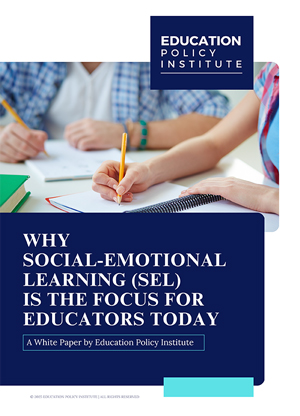AI Has the Potential to Transform Education
Artificial Intelligence (AI) is having a significant impact on the education landscape today and has the potential to revolutionize how our education system functions. It can enhance institutional competitiveness, empower teachers and learners of all abilities and backgrounds, and fill gaps in learning and teaching. The market size of AI in education surpassed USD 4 billion in 2022 and is expected to exhibit a compound annual growth rate (CAGR) of over 10% from 2023 to 2032. This growth can be attributed to the increasing preference for personalized learning approaches. This means that schools must undergo a transformative shift in their educational models to incorporate personalized and adaptive learning experiences for students. This change is essential for accommodating individual needs and learning styles, enabling a more customized and tailored approach to education.
Students Benefit from AI in Various Ways…
From beneficial student advantages to fully-automated tutoring sessions, AI is beginning to reshape not only the thought processes but also the systems and daily structures upon which individuals rely.
-
Personalized Learning
AI has the potential to personalize education, with adaptive learning systems providing tailored instruction and support. Chatbots equipped with AI can offer personalized feedback and assistance, keeping students engaged and motivated. AI-powered recommender systems generate custom assessments and suggest new learning areas. These advancements benefit learners now and in the future.
-
AI-Enhanced Tutoring
AI has revolutionized tutoring and study programs, ushering in remarkable advancements. Utilizing AI-powered platforms, virtual mentors can now track student's progress in real-time and offer instant feedback, eradicating the necessity of prolonged waiting periods for teacher responses. This immediate virtual feedback empowers students to enhance their efficiency and productivity, enabling them to access prompt guidance without delay.
-
Intelligent Textbooks
Stanford researchers developed an "intelligent textbook" called "Inquire" to enhance student's reading experiences. This iPad app monitors focus and attention, offering interactive text with touch-and-click accessibility. Students can instantly access word definitions, highlight important sections, and add annotations. The system goes beyond traditional textbooks, suggesting personalized questions for deeper exploration. It adjusts reading levels, includes visuals and supplementary materials, and promotes comprehension. "Inquire" ensures material is accessible and engaging, supporting student's comprehensive understanding.
Teachers and schools can also embrace AI to gain an edge…
Embracing AI in education opens up a world of opportunities not only for students but also for teachers and all the stakeholders involved.
-
Automated tasks
AI possesses the remarkable capability to streamline mundane tasks, such as administrative work, paper grading, learning pattern analysis, and general question responses. Thankfully, with the assistance of automation tools, educators can automate manual processes, thereby freeing up valuable time to concentrate on teaching essential skills and knowledge.
-
Responding to inquires
AI-powered chatbots equipped with a school's comprehensive knowledge base are capable of addressing a wide range of common and repetitive inquiries without requiring the involvement of a faculty member. By bypassing the need for educators to handle these routine queries, AI technology provides them with additional time to dedicate to important tasks such as lesson planning, curriculum research, or enhancing student engagement.
AI has already emerged as a trailblazer in the field of education
One would be astounded by the current application of AI in education. Real-world examples demonstrate how AI is applied in the educational domain.
-
AI is employed in educational management and delivery. Schools and educational institutions rely on AI tools to handle administrative tasks such as creating timetables, monitoring student attendance, and managing homework.
-
Educational chatbots have emerged as prominent AI applications. Chatbots are utilized for tasks such as student admissions, answering queries, offering round-the-clock assistance, providing feedback, and delivering tutoring.
-
Dialogue-based tutoring systems have been developed, such as AutoTutor from the University of Memphis and Watson Tutor by IBM and Pearson. These systems engage in conversations with students, emulating the experience of interacting with live teachers.
-
To enhance student's writing abilities, automated writing evaluation tools have been introduced. Notable examples include Turnitin and WriteToLearn, which provide feedback to students on their writing, aiding in the improvement of their writing skills.
Latest AI-Driven Advancements in Education
Technology in classrooms has become an enduring presence, and ChatGPT is one such advancement that is capturing attention these days. The conversational AI tool proves to be a valuable asset for students who require assistance with their homework. By presenting queries or challenges, students can receive prompt responses and guidance. ChatGPT possesses the ability to adjust to each student's specific requirements, offering customized instruction and support. As technology progresses, it will enhance its capacity to comprehend student's learning styles, preferences, and areas of weakness, facilitating personalized and efficient learning encounters. While the potential of the software is promising, it is imperative to maintain a balance between resorting to AI technology and preserving the human element in education.
KeyNotes
AI is revolutionizing education, enhancing personalized learning, streamlined assessment, and efficient tools. Emerging tools come with certain limitations that can restrict human thinking capacity. In the case of students, these factors significantly impact their learning experiences. It is pivotal to employ AI in classrooms wisely, guiding students to navigate it ethically.
Latest
Trends blogs
- Automation, Artificial Intelligence, and the Future of Human-Centered Education
- Mid-Career Education in a Changing Labor Market
- The Next Phase of STEM Education: The Role of Artificial Intelligence in Classroom Curricula
- Education Technology in 2026: Trends Driving the Next Wave of Learning
Focus blogs
- Research-Driven Education: Strengthening Strategies, Policies, and Classroom Practice
- Professional Certifications for Career Growth: What Students and Young Professionals Need to Know
- Building a High-Impact Center of Excellence: What You Need to Know
- Beyond Graduation: The Importance of Lifelong Learning in Higher Education





